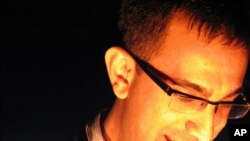In the United States, a stand-up comedy routine about Indians in America is never complete without a joke about a miserly shopkeeper with a heavy accent, chasing away riffraff with a broom. But that stereotypical humor doesn't make much sense in India. At least that's what three Indian-American comedians have found on their unique tour of the South Asian nation.
The “Make Chai, Not War” showcase features comedians Rajiv Satyal, Azhar Usman and Hari Kondabolu. They use stand-up comedy to talk about religious tolerance, breaking down prejudices and their experiences growing up Indian-American in the United States.
While the tour sponsored by the U.S. State Department has lofty ambitions, Rajiv Satyal said, “Our goal is to make people laugh. I know that sounds simple, but it seems that can get lost sometimes in the grander scheme of things.”
Satyal added that he wanted to “make them laugh in the room and, make them think on the way home.”
“If you can change some minds through some of the things you’re saying, and get people to talk, then hopefully, we’re promoting religious and racial harmony without being preachy,” he said on the phone from Patna, the tour’s fourth stop.
The idea for the tour came from a State Department cultural attaché who saw Azhar Usman perform in London several years ago, according to State Department spokesperson Emily Horne. The officer brought Usman over for a tour in India, and he was so well received that the State Department decided to invite the full group this time.
While the focus of the two-week tour, which ends January 17, is stand-up comedy, the performers are also holding discussions with audiences, facilitating workshops and giving interviews to the media, said Horne. The group is making appearances in Chennai, Bangalore, Hyderabad, Calcutta, Durgapur, Bombay and Patna.
The comedy routines have been well received, according to Satyal, playing to as many as 1,200 people in sold out shows. Satyal said he does the same act no matter where he’s performing, but he did say there have been occasions on the tour where he’s slowed down the pace to be more easily understood.
Not all of his jokes work as well in India as they do back home in the U.S. Satyal said he has stopped trying to get laughs using the stereotype in the U.S. that all convenience stores are owned by Indians. On the flipside, he said he can do jokes about the Indian stereotype that Gujaratis are very frugal, which would not be understood in the U.S.
Satyal also noted that his comedic style is often new to his Indian audiences.
Traditional Indian comedy has more mimicry of politicians and Bollywood stars, Satyal said, adding that stand-up is a very American form.
“To get up and talk about, 'Here’s who I am and here’s my point of view, here’s what I think,' … it’s very American,” he said. “[To say] 'Here are my foibles, here are my flaws and my faults,' is very new to Indians.”
Satyal got his start in comedy in 2002, when his brother spotted a newspaper ad for a contest for the funniest person in Cincinnati, Ohio, Satyal’s hometown in the Midwestern U.S. He made it to the semifinals the first time and won it the next year, he said.
Comedy is not a common path for Indian-Americans, many of whom are pushed by their parents into more traditional fields like medicine, academia, law and business.
“Entertainment is kind of the last area someone would go into,” Satyal said, adding that for his parents’ generation, many don’t quite understand making fun of Indian-Americans in a self-deprecating way. But he said that his own parents, who came to the U.S. in the 1970s, have always been supportive of his decision to become a comedian.
Additionally, he thinks comedy can be a positive force for the Indian-American community.
“Only when a community is doing well can comedians really emerge and make fun of it,” he said. “It’s actually a compliment that we’re making fun of ourselves.”




